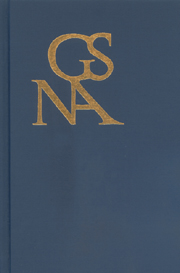Book contents
- Frontmatter
- Contents
- Towards a German Romantic Concept of the Ballad: Goethe's “Johanna Sebus” and Its Musical Interpretations by Zelter and Reichardt
- “Trübe” as the Source of New Color Formation in Goethe's Late Works Entoptische Farben (1817–20) and Chromatik (1822)
- The Myth of Otherness: Goethe on Presence
- The Transformation of the Law of Nations and the Reinvention of the Novella: Legal History and Literary Innovation from Boccaccio's Decameron to Goethe's Unterhaltungen deutscher Ausgewanderten
- “Hear him! hört ihn!”: Scholarly Lecturing in Berlin and the Popular Style of Karl Philipp Moritz
- Hypochondria, Onanism, and Reading in Goethe's Werther
- Judex! Blasphemy! and Posthumous Conversion: Schiller and (No) Religion
- Esoterik der “Macht, die über uns waltet und alles zum Besten lenkt”: Das Wissen vom Anderen in Goethes Wilhelm Meisters Lehrjahre
- Goethes Fortgepflanztes: Zur Unbegrifflichkeit der Morphologie
- Special Section on Die Entstehung der Neueren deutschen Literaturwissenschaft aus der Goethe-Philologie
- Book Reviews
Esoterik der “Macht, die über uns waltet und alles zum Besten lenkt”: Das Wissen vom Anderen in Goethes Wilhelm Meisters Lehrjahre
Published online by Cambridge University Press: 05 February 2013
- Frontmatter
- Contents
- Towards a German Romantic Concept of the Ballad: Goethe's “Johanna Sebus” and Its Musical Interpretations by Zelter and Reichardt
- “Trübe” as the Source of New Color Formation in Goethe's Late Works Entoptische Farben (1817–20) and Chromatik (1822)
- The Myth of Otherness: Goethe on Presence
- The Transformation of the Law of Nations and the Reinvention of the Novella: Legal History and Literary Innovation from Boccaccio's Decameron to Goethe's Unterhaltungen deutscher Ausgewanderten
- “Hear him! hört ihn!”: Scholarly Lecturing in Berlin and the Popular Style of Karl Philipp Moritz
- Hypochondria, Onanism, and Reading in Goethe's Werther
- Judex! Blasphemy! and Posthumous Conversion: Schiller and (No) Religion
- Esoterik der “Macht, die über uns waltet und alles zum Besten lenkt”: Das Wissen vom Anderen in Goethes Wilhelm Meisters Lehrjahre
- Goethes Fortgepflanztes: Zur Unbegrifflichkeit der Morphologie
- Special Section on Die Entstehung der Neueren deutschen Literaturwissenschaft aus der Goethe-Philologie
- Book Reviews
Summary
Den anscheinenden Geringfügigkeiten des “Wilhelm Meister” liegt immer etwas Höheres zum Grunde, und es kommt bloß darauf an, daß man Augen, Weltkenntnis und Übersicht genug besitze, um im Kleinen das Größere wahrzunehmen.
(Goethe zu Eckermann 25.12.1825)Zu beginn der Lehrjahre mangelt es Wilhelm wie jedem jungen Mann an Erfahrung, Können und Wissen. Er ist ein Anfänger in der Liebe, erweist sich als Dilettant in der Schauspielkunst und seine Hoffnung auf ein anderes Leben führt ihn in eine Reihe von Krisen. Sein Ausbrechen aus der bürgerlichen Enge seiner Herkunft beweist jedoch Mut und sensibilisiert ihn für eine Offenheit, die neue Erfahrungen ermöglicht. Wilhelm entwickelt im Gegensatz zu seinem Jugendfreund Werner schon früh auch ein Gespür dafür, was seiner Entwicklung hin zu einem freieren Selbst gut tut. Ihm schwebt etwas von einer Entfaltung der Persönlichkeit vor, wie es seinerzeit eigentlich nur dem Aristokraten angemessen war. Geleitet von der Idee einer ganzheitlichen Bildung macht Wilhelm sich auf in die weite Welt. Was aber leitet ihn dabei? Woher nimmt er das Vertrauen, seinen Weg durch die Fremde des vor ihm liegenden Lebens zu finden? Wie gelangt er zu einer Bildung des Selbst, nach welcher dessen Subjekt immer erst wird, was es doch schon ist? Welches Wissen muss von Wilhelm erworben werden, um der Meister schließlich zu werden, der er doch dem Namen nach von Geburt her ist?
Wir wollen vor dem Hintergrund dieses Fragehorizontes die Art von Wissen untersuchen, welche der Erzähler deutlich von derjenigen abzuheben weiß, die für die standesgemäße Ausbildung zu einem soliden Kaufmann benötigt wird.
- Type
- Chapter
- Information
- Goethe Yearbook 19 , pp. 165 - 184Publisher: Boydell & BrewerPrint publication year: 2012

